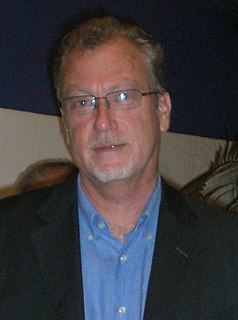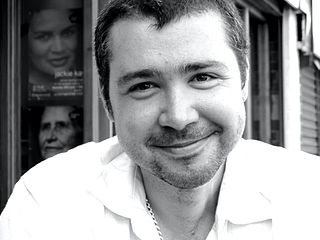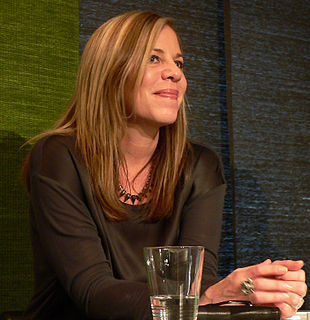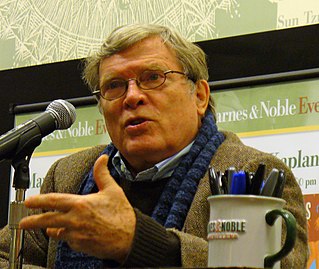A Quote by Brad Warner
I think real enlightenment is total sanity, a kind of acceptance of what actually is. It does involve a kind of different way of looking at things. As I've done this Zen practice for years and years, I've acquired what I realize is an almost upside down view of life compared to what most people think, which is just what I used to think it was too. It's not really an insane view, at least I hope it's not.
Related Quotes
Sanity and enlightenment...I've been reading a new book Dogen's Genjo Koan: Three Commentaries, and it contains a commentary on Genjo Koan by Shunryu Suzuki, the author who wrote Zen Mind, Beginners Mind. He doesn't mention sanity at all but I think that one possible definition of enlightenment would be a kind of profound sanity, where being insane is no longer an option.
We actually needed the memory - if you see the film - as a very different kind of a plot device of revealing some information to our main character. So we chose to represent it as these sort of beautiful little snow globes, which kind of, weirdly, that's the way we think of memories - at least, most of the folks that we talked to. You think of these memories as being very pure and absolute and unchanging. That's not actually real life.
I think that feeling of reward comes from being able to find sometimes an unexpected reflection or insight that seems to transcend the description itself, where you actually realize you're concluding something that is a point of view, that may come across and actually touch people's conscience or minds in a way that could change, at least if not things, change points of view.
And it's kind of my own fault too, in the sense that I've used my own life as a literary device so much. I think people feel very comfortable reviewing the idea of me, as opposed to what I've actually written. I find that most of the time, when people write about one of my books, they're really just writing about what they think I may or may not represent, as sort of this abstract entity. Is that unfair? Not really. If I put myself in this position where I'm going to kind of weave elements of memoir into almost everything, well, I suppose that's going to happen.
I think reading intelligent expressions of different points of view is a good thing, and there is a way in which being in academia in a classroom at the University probably gives you, can give you an academic view of things, and reading actual real time debates about what should we do in Syria or the Buffett rule, budget issues...gives you a kind of sense that's hard to get in a classroom.
Most people, if they think at all about the dictionary, think of it as this fixed object given to us from on high. It is the thing that legitimizes language and makes language real. You never think that it's actually compiled by living, breathing nerds like me. When you realize that it's compiled by people, it becomes a different thing, a different kind of document.
I think I've actually returned to a kind of realism about how the world works. That's helpful. Because in a way, no matter who's in charge of the corporation that the United States is, the direction in which it is taken seems to be inexorable. So, you just get the job of being the front man for four or eight years. Now, most people realize that's what you are.
UNIX has a philosophy, it has 25 years of history behind it, and most importantly, it has a clean core. It strives for something - some kind of beauty. And that's really what struck me as a programmer. Operating systems that normal home users are used to, such as DOS and Windows, didn't have any way of life. Nobody tried to design Windows - it just grew in random directions without any kind of thought behind it. [...] I don't think Microsoft is evil in itself; I just think that they make really crappy operating systems.
There's also something that is often mistaken for enlightenment which is a kind of insanity. Often, people will have some kind of weird experience which is quite abnormal and think, "Oh my God, that's it, I understand everything" because they start seeing things in a very weird way and think that's how enlightened people see things as well.
We are little animals walking on the ground, we have a certain life time, we are acting and interacting with different people, and we are trying to build things, but we are just some sort of virus compared to the entire sky. You always have to remember that the moon, the earth, the sun, they are like the real universal objects. We are just passing by, and it makes life more beautiful to think that way. More relaxing to think that way, that nothing is really important, because you give yourself much more confidence and you forgive yourself more things when you think about that.
It's not that kind of love. It's the real kind. The unconditional kind. The nonjudgemental kind. Not the physical kind. I love you as a fellow soul who inhabits this earth. I love you as a fellow immortal. I love you because I finally understand what made you the way you are. And if I could change it, I would. But I can't—so I choose to love you instead. And my hope is that my acceptance of you will spur you to do something good too, but if not—" I shrug. "At least I can say I tried.
I think so, too. I know I felt that way. For years. It was as if I was a character in a movie and the real action was about to start at any minute. But I think some people wait forever, and only at the end of their lives do they realize that their life has happened while they were waiting for it to start.

































